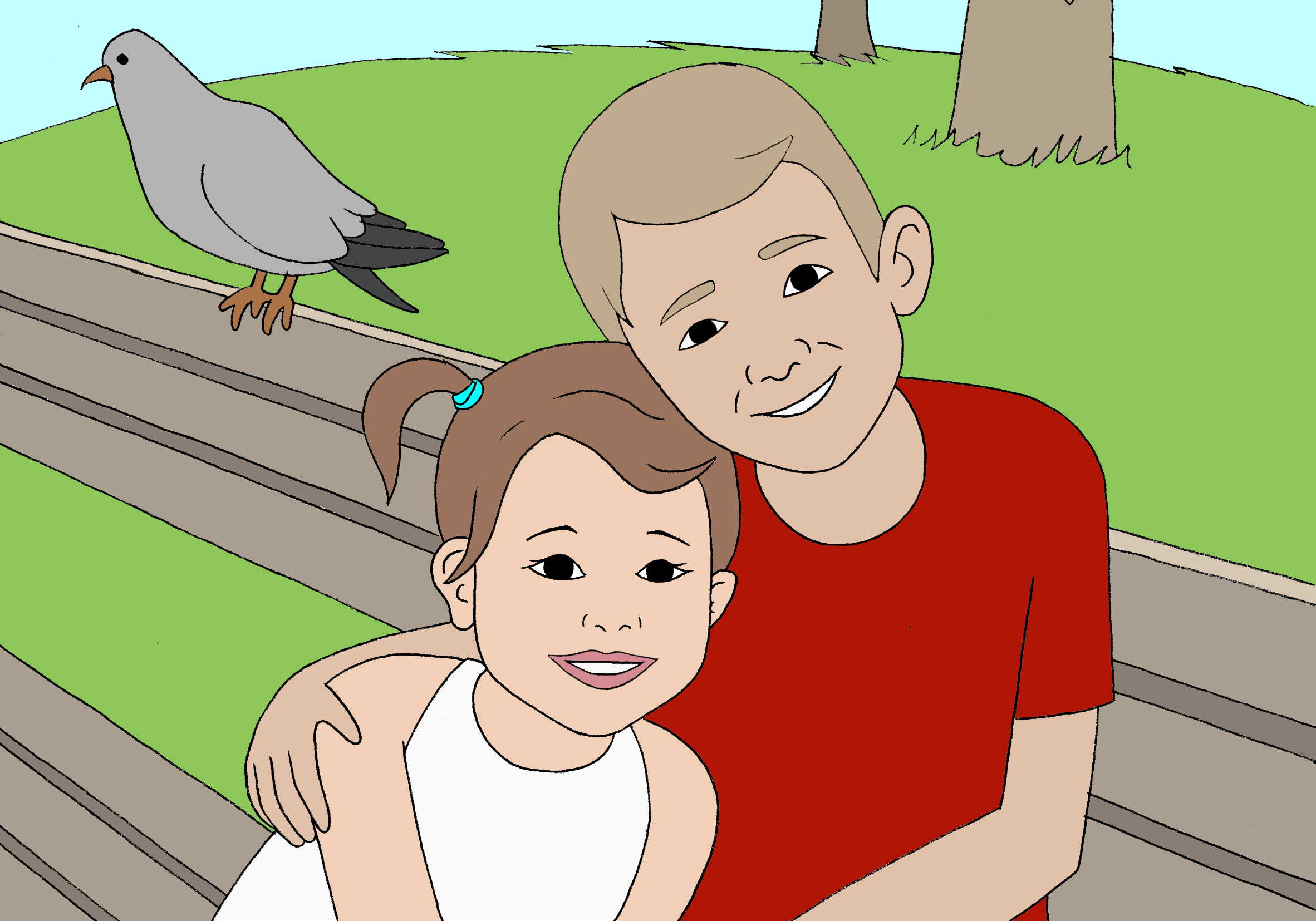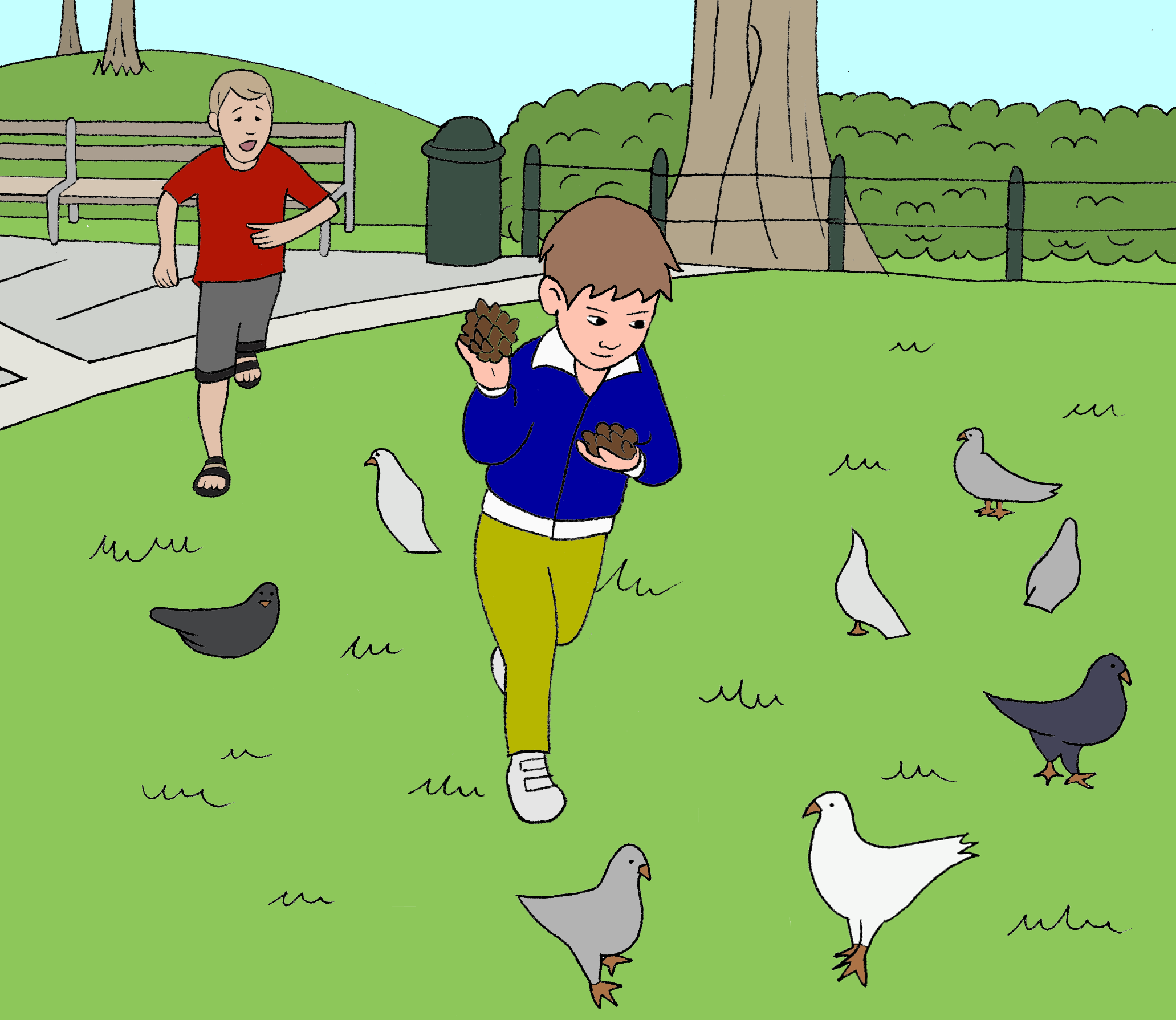READY-SET-GO GENTLY Interaction Detail
The Nelson Family and the Park Pigeons

The next morning, Benji decides that the family needs to have a fun day together. April agrees, and they head for the park.
We will watch them as Benji guides them through an interesting experience. It’s a great example of a READY-SET-GO GENTLY interaction, although Benji doesn’t call it that. He simply does what comes naturally for him.
Benjamin, April, Devin, and Kyleigh have been playing for a while, and now they are eating a picnic lunch. It is a beautiful day, and several other families are doing the same thing. Not far away, a little boy about Devin’s size begins to chase some pigeons, and then this little boy begins to throw pinecones at the pigeons. Devin gets upset. He jumps up and runs after the other child. “No! Stop that!” yells Devin. “Don’t hurt the birds!”
The other child stares at Devin and then throws another pinecone. He has several more at the ready, and Devin tries to grab the next pinecone away from the child. Then the other little boy yells out, “Stop bothering me!”
Devin yells back, “Stop bothering those birds. You are bad!”
The other child’s mom has not been paying any attention, but at this point, she suddenly notices Devin harassing her child! She is not pleased. Clearly, this situation could go downhill fast!
April notices too, and she starts yelling, “Devin! Stop! Leave him alone.”
Fortunately, Benjamin has been paying attention all along, so he understands the situation, and is READY to do something. The question, of course, is exactly what to do. Benjamin does a SET statement. He says calmly but firmly to Devin, “Devin, come here. We need to talk.”

So now the stage is set. A simple, calm, clear request has been made, ONCE. The GO GENTLY depends on what Devin does next. Here are three possibilities.
Possibility One: Devin comes over to his Dad as requested.
In this case, the problem is defused, and Benjamin’s GO GENTLY will be to praise Devin and to help Devin understand a bit more. Benjamin gives Devin a hug, and says, “Devin, thank you so much for coming when I asked. You are right about the birds. But we don’t want to get in a fight with other people.” Benjamin then pulls out his phone. “Let’s look those birds up and see what we can learn about them.” Benjamin does a quick search on “pigeons” and finds some great bird pictures for Devin to look at. In this way, Devin gets positive attention immediately. He is distracted to a learning situation rather than a confrontation.
Possibility Two: Devin does not come. He argues with Benjamin. “But Dad, he’s throwing things at the birds!”
In this case, Benjamin’s GO GENTLY is to get up and calmly walk over to Devin. He puts his arm on Devin’s shoulders and repeats the request, still calmly. “Devin, come with me. We need to talk.” With firm but gentle pressure on Devin’s shoulder, Benjamin draws Devin in the direction of their own table. If Devin comes, then Benjamin will give a hug, give praise, distract with pigeon pictures on the phone, and all will be well.
Possibility Three: Devin does not come. Benjamin walks to him but Devin pays no attention. Devin is upset. He continues yelling at the other child and trying to grab the pinecones away from him!
In this case, Benjamin must quickly do a different GO GENTLY. It is this: Benjamin gently but firmly picks Devin up and carries him back to their own picnic table. Benjamin does not try to reason with Devin at this moment. It would be pointless, because Devin is 5 years old and is out-of-control upset. Devin is genuinely upset about the birds, which he is quite sure are being harmed by the other child. He is angry at the child, and now he is angry at Benjamin for stopping him from helping the birds.
Fortunately, Benjamin is a sensible father. He knows that Devin is “right” in a way, but Benjamin also knows there is nothing at all to be gained by getting into an argument in the park. An argument in public is not a good idea at all. Neither an argument with a highly emotional Devin, nor an argument with this unknown family, will accomplish anything at this moment. He will calmly remove Devin from the situation, and they will discuss things later.
April gathers up Kyleigh and the remaining food and they move to a more distant spot. Devin has to learn that when there is a conflict, he must mind his parents. The parents have more wisdom, and they sometimes make requests that he does not understand. It is because they love him. He is safe when he follows the requests of his parents.
This parenting plan works. When the parent is fairly consistent in the small mini-situations that happen all the time, the result is that, over time, the child learns to mind the parent. And even more important, over time, the child learns to make these types of wise decisions for himself. The child cannot learn the best responses without guidance from the parents. With no guidance here, Devin would have continued to defend the birds until he and the other little boy had gotten into a physical fight and no good would have come of that at all!
You can see that the parent has to stay on READY nearly all the time. Benji and April were paying attention to what their children were doing. Benji was READY to get up and gently intervene if needed. His SET statement was a calm and simple request, which he did not repeat. His GO GENTLY fit Devin’s response. Benji made certain that if Devin complied with the request, he got plenty of positive attention immediately. That’s very important!
You can do this by taking thought and defining your actions.
But parenting is NOT EASY.
Your child is always on “GO.”
Parenting takes tremendous energy.

